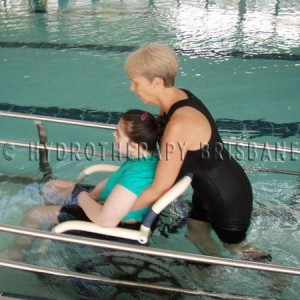 There are many neurological conditions that will benefit from specific aquatic exercise and physiotherapy thanks to the reduced weight and the pre-functional advantage that the water offers. Conditions that may benefit include but are not limited to:
There are many neurological conditions that will benefit from specific aquatic exercise and physiotherapy thanks to the reduced weight and the pre-functional advantage that the water offers. Conditions that may benefit include but are not limited to:
- multiple sclerosis
- stroke (CVA)
- parkinson’s disease
- cerebral palsy
- traumatic brain injury.
 Some patients may have very limited range of motion in a joint or limb on land, however when in water we often see more movement and are therefore able to strengthen and stabilize more easily. Sit to stand and walking on land may use up all your energy after one or two repetitions. When in water, buoyancy effects mean you effectively weigh less so may be able to work harder, get more repetitions and ultimately improve your strength, endurance, function and balance.
Some patients may have very limited range of motion in a joint or limb on land, however when in water we often see more movement and are therefore able to strengthen and stabilize more easily. Sit to stand and walking on land may use up all your energy after one or two repetitions. When in water, buoyancy effects mean you effectively weigh less so may be able to work harder, get more repetitions and ultimately improve your strength, endurance, function and balance.
For some with less function goals and benefits may be:
- pain management
- maintenance of joint range and muscle length
- early fitness and early function such as rolling over and sitting balance.
Often upper limb rehabilitation is considered secondary to the functional rehabilitation required for walking. Whether it be pain management for a painful shoulder post CVA or promoting and facilitation of upper-limb activity in traumatic brain injury, the water and its properties lend themselves to upper limb rehabilitation.
There are many types of conditions that can be treated with aquatic physiotherapy. Please feel free to contact us to discuss whether hydrotherapy might be beneficial for you or someone you care for.